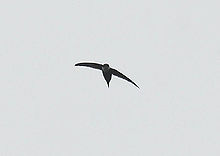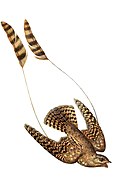
Urocissa is a genus of birds in the Corvidae, a family that contains the crows, jays, and magpies.

The white-winged swallow is a resident breeding swallow in tropical South America from Colombia, Venezuela, Trinidad, and Argentina. It is not found west of the Andes. This swallow is largely non-migratory.

The lesser swallow-tailed swift or Cayenne swift is a species of bird in subfamily Apodinae of the swift family Apodidae. It is found from southern Mexico through Central America; in every mainland South America country except Argentina, Chile, Paraguay, and Uruguay; and on Trinidad.
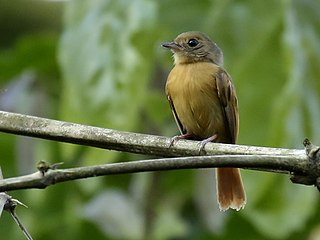
The ruddy-tailed flycatcher is a small passerine bird in the family Tityridae. Its range extends from southeast Mexico south to the Amazon rainforest. It is the only member of the genus Terenotriccus, but some authorities place it in genus Myiobius. However, it differs in voice, behaviour, and structure from members of that group.

Myiarchus is a genus of birds in the tyrant flycatcher family Tyrannidae. Most species are fairly similar in appearance and are easier to separate by voice than by plumage.

Lichenostomus is a genus of honeyeaters endemic to Australia.

The golden swallow is a swallow endemic to the Caribbean island of Hispaniola and was once native to Jamaica, but is now extirpated there. It is restricted to isolated montane forests that primarily consist of the Hispaniolan pine. This species is considered to be a vulnerable species by the International Union for Conservation of Nature (IUCN). The exact cause of its extirpation from Jamaica is unknown, but likely factors include predation by introduced mammals and habitat loss, although the habitat loss theory is not supported by much evidence. The last sighting of the nominate subspecies was in Hardwar Gap, with three birds being seen on 8 June 1989.

Poospiza is a genus of finch-like birds in the tanager family Thraupidae that are found in both the South American lowlands and the Andes mountains. Generally they are arboreal feeders in light woodland and scrub. All have extensive grey to their plumage, and have—often bold—white or rufous markings.

The tree martin is a member of the swallow family of passerine birds. It breeds in Australia, mostly south of latitude 20°S and on Timor island. It is migratory, wintering through most of Australia, New Guinea, Indonesia east of the Wallace Line and the Solomon Islands. It is a vagrant to New Zealand, where it has bred, and New Caledonia. This species is frequently placed in the genus Hirundo as Hirundo nigricans.

Tachycineta is a genus of birds in the swallow family Hirundinidae. There are nine described species all restricted to the Americas.
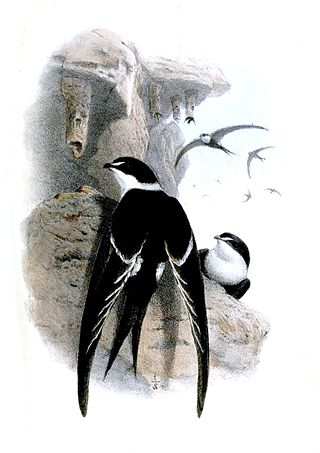
The great swallow-tailed swift is a species of bird in subfamily Apodinae of the swift family Apodidae. It is found in Costa Rica, Guatemala, Honduras, Mexico, and Nicaragua.

The mouse-coloured penduline tit or mouse-colored penduline tit is a species of bird in the family Remizidae. At 8 cm (3.1 in) in length, it is one of the two shortest birds native to Africa, alongside the tit hylia.

Yellow penduline tit is a species of bird in the family Remizidae. This small yellow passerine bird is found in semi-arid savanna regions of West Africa.

The white-backed swallow is a member of the swallow family Hirundinidae and is endemic to Australia. It is the only species placed in the genus Cheramoeca. As with all swallows, it is characterised by adaptation to aerial feeding. It can be identified by its white back, surrounded by black wings and tail. It has a wide distribution, from the southern part of the Australian continent, up to the Tropic of Capricorn. The white-backed swallow prefers grasslands and will create a burrow nest.

The long-tailed reed finch is a species of South American bird in the tanager family Thraupidae. It is the only member of its genus Donacospiza.

Dysithamnus is a genus of insectivorous passerine birds in the antbird family, Thamnophilidae. Species in this genus are known as antvireos.
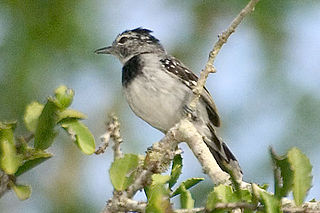
Herpsilochmus is a genus of insectivorous passerine birds in the antbird family (Thamnophilidae). They are found in forest, woodland and shrub in South America, although a single species the rufous-winged antwren also occurs in Panama. All are relatively small antbirds that are sexually dichromatic. In most species males are essentially light grey with a black crown and black-and-white wings, while females are more buff or rufous with black-and-white crown.

Myrmoborus is a genus of passerine birds in the antbird family, Thamnophilidae.

The Chilean swallow is a species of bird in the family Hirundinidae. It breeds in Chile and Patagonia, migrating north as far as Bolivia, Paraguay, and Rio Grande do Sul.
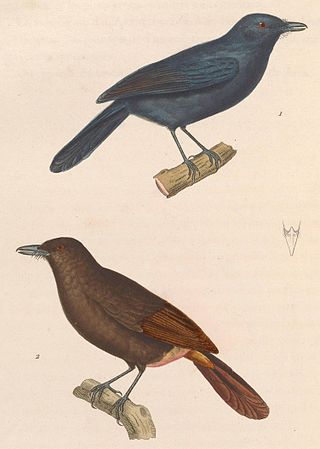
Thamnomanes is a genus of insectivorous birds in the antbird family, Thamnophilidae. They are restricted to the Neotropics and are important components of forest mixed-species feeding flocks.
